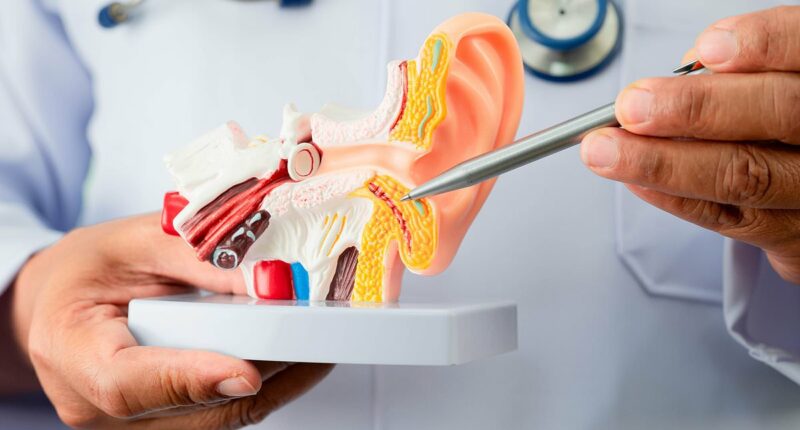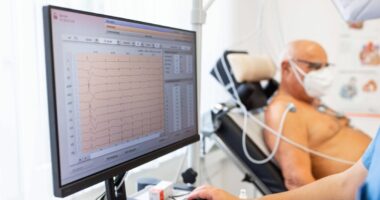Share this @internewscast.com
Research has indicated that obesity may significantly increase the likelihood of developing tinnitus.
In a study conducted by scientists from Pakistan involving over 5,000 men, it was found that those with a body mass index (BMI) over 30 were nearly 50% more likely to experience tinnitus compared to men with a healthy weight.
A BMI score between 18.5 and 25 is considered healthy, 25 to 29 is classified as overweight, and 30 or above is categorized as obese—a level at which the risk for serious health issues increases.
The researchers have not pinpointed the exact reasons behind this correlation.
However, they propose that the link might be due to obesity-related inflammation and vascular damage, which affect blood vessels and could potentially impair blood flow, leading to auditory issues.
The study suggests that “obesity might independently contribute to tinnitus” or could be related to other factors such as inflammation, metabolic syndrome, or mental health concerns.
Writing in the journal Cureus, they added that the results ‘underscore the importance of considering body weight and metabolic health in tinnitus research and clinical management’.
Tinnitus — a constant ringing or buzzing in the ears, even when no external sound is present — affects an estimated 7.6 million people in the UK.

Tinnitus — a constant ringing or buzzing in the ears, even when no external sound is present — affects an estimated 7.6 million people in the UK
For most, it is a nuisance. But for 1.5million with severe symptoms it is a debilitating problem with no known cure.
Previous research has suggested that once tinnitus persists for more than a month there is an 80 to 90 per cent chance that it will become permanent.
In the study, the researchers from Lahore General Hospital analysed the health records of 5,452 US adults aged 20 and over.
Tinnitus was reported by 863 (17.2 per cent) of all study participants, with 433 of these obese.
They found obesity was ‘significantly associated with tinnitus’, with obese adults 44 per cent more likely to have tinnitus compared to non-obese people.
After accounting for factors that could skew the results such as whether they smoked and how much sleep on average they got, obese adults still had an increased risk of 41 per cent.
‘Participants with tinnitus tended to be older, more often male, and more likely to be depressed compared with those without tinnitus,’ the researchers added.
The prevalence of tinnitus also increased with age.
‘The substantial burden of obesity in recent years and its association with tinnitus highlight the importance of considering modifiable metabolic risk factors as part of comprehensive tinnitus management,’ they said.
‘Further research is required to understand the pathways linking obesity and tinnitus and determine whether weight reduction might help mitigate tinnitus.
While there is no cure yet for tinnitus, some lifestyle measures have been shown to help ease the condition.
A 2024 study found a third of patients who practised mindfulness for two months reported reduced symptoms, while another showed people who exercised more than two-and-a-half hours a week saw improvements.
Salt, alcohol, caffeine and foods high in natural plant chemicals called salicylates – such as coffee, avocados and blueberries — may make symptoms worse.
It comes as a raft of long-awaited anti-obesity measures came into force in England last month.
Under new Government laws, buy one, get one free deals on sweets, crisps, sugary drinks and other snacks have been outlawed in England, along with free refills of fizzy drinks in restaurants and cafés.
The crackdown will be followed in January by a ban on online adverts for unhealthy food and drink, and restrictions on TV advertising before 9 pm.
Ministers say the policies are designed to curb Britain’s growing obesity crisis.
A sobering report last year warned that Britain’s spiralling weight problem has fuelled a 39 per cent rise in type 2 diabetes among under-40s, with around 168,000 young adults now living with the disease.
Excess weight has also been linked to at least 13 types of cancer and is the second-biggest preventable cause of the disease in the UK, according to Cancer Research UK.
















